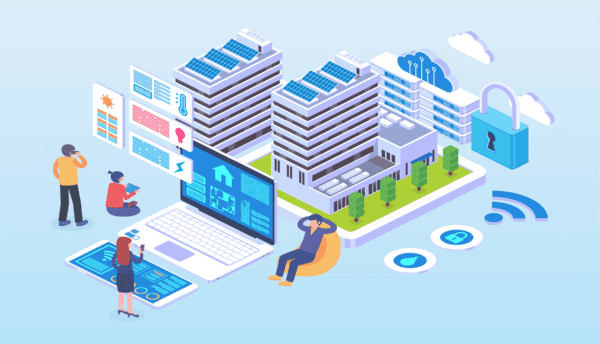
From predictive analytics to virtual reality and IoT, advanced technologies are changing the real estate industry we know of. According to research studies, global real estate professionals believe that advanced technologies:
- Reduce construction and management costs (68%)
- Simplify financing and investment processes (59%)
- Boost operational efficiencies (51%)
- Help them meet regulatory standards (39%)
In this article, you will learn about several tech areas you should pay attention to in 2021.
1- Virtual and Augmented Reality
VR and AR technologies have been growing impressively fast over the past few years. Research says that 83.1 million American customers used AR at least once monthly in 2020.
Virtual reality is faster and more convenient. Customers do not have to attend various Open House events in a row. Instead, all properties are available to them online. That is particularly important in the age of Coronavirus and social distancing measures.
Most importantly, VR and AR are flexible and engaging. They gamify user experiences and build excitement. Users can make virtual changes to a property, such as adapting the style and interior design.
Realtors can even use AR and VR to help customers visualize projects that have not been finished yet. That helps them make faster buying decisions.
2- Big Data and Predictive Analytics
With the rise of the technologies mentioned above, collecting customer data has never been easier. However, companies usually do not use these data sources strategically. They collect industry information without putting it to good use. Advanced data analytics solutions allow you to analyze massive chunks of customer data and use them to personalize customer experiences and boost sales.
By monitoring both historical and real-time information, you can identify patterns, trends, demographic data, and potential property value in various locations.
For example, one of the biggest problems real estate agents face is price fluctuations. Predictive analytics helps you minimize this risk. If you want to price homes for sale in the Phoenix Metro, you can perform real-time regional cost analysis and the forecasted price fluctuations in that area.
According to a study by McKinsey, the real estate apps based on AI can predict changes in rent rate with 90% accuracy.
3- The Internet of Things
The Internet of Things consists of sensors, smart devices, and integrated computers around the world. They are connected via the internet, continuously sending and receiving information. They use the cloud to collect, analyze, and evaluate data.
The adoption of IoT in real estate can benefit the industry in multiple ways.
For starters, IoT plays a fundamental role in house hunting. Customers can now use mobile apps to view houses online without having to visit each site. That saves them a lot of time and energy. Above all, IoT helps customers focus on the locations that are relevant to them.
Another benefit of IoT is the evolution of smart homes and buildings. Each smart device in your home is a part of the Internet of Things. Smart home tech provides multiple advantages to homeowners, such as improved security, energy efficiency, and an enhanced resale value.
4- Artificial Intelligence and Machine Learning
Artificial intelligence has revolutionized almost every aspect of our lives, including real estate. According to PWC, companies use AI to streamline repetitive and time-consuming tasks, such as scheduling, paperwork, and timesheets.
Gone are the days finding, purchasing, or selling real estate properties was an overwhelming and complicated process. With artificial intelligence and machine learning, you can turn raw data into invaluable customer insights. That way, you can learn more about your customers and provide them with better, personalized customer experiences.
Here is how AI benefits:
- AI personalizes user experiences. It provides home recommendations based on customers’ location, values, trends, needs, family status, and personality.
- Chatbots in real estate use natural language processing and generation technologies. They collect customer data and provide natural and accurate feedback 24/7.
5- Blockchain
The global blockchain sector will grow from $3.0 billion in 2020 to $39.7 billion by 2025. It plays a fundamental role in the real estate sector, changing the transaction process.
In the past, transactions of high-value properties were commonly handled offline, involving various person-to-person engagements.
The blockchain opens up new opportunities for seamless and secure digital transactions. Assets can be tokenized and traded as cryptocurrencies. As a decentralized technology, the blockchain guarantees greater trust and security.
Advanced Technologies are the Future of Real Estate
Real estate technologies are growing at an astonishing pace. For any real estate professional, implementing the tools and trends mentioned above is inevitable. They will give you a competitive advantage in the overcrowded industry. Most importantly, they will help you boost customer satisfaction and close sales faster.
Do you use any of these technologies to give your real estate business a competitive advantage? How do they improve customer satisfaction? We are listening!








